Response to the Anniversary of the Dobbs Decision from the AME Church Health Commission
By Rev. Dr. Ann Marie Bentsi-Addison, Women’s Health Coordinator, Connectional Health Commission
As we approach the first anniversary of the Supreme Court’s Dobbs vs. Jackson Women’s Health Organization (Dobbs), the International Health Commission of the African Methodist Episcopal Church (IHC AME Church) has remained vocal about its opposition to the ruling and its harmful consequences, particularly for black women.
The Dobbs vs. Jackson Women’s Health Organization case centers on a Mississippi law that banned abortions after 15 weeks of pregnancy. The law was struck down by a district court in 2019, but the state of Mississippi appealed the decision, leading to the Supreme Court’s decision in late 2021 that such bans are, in fact, constitutional. This decision has far-reaching consequences not only for reproductive rights but for the health and well-being of BIPOC individuals.
It is well-documented that Black, Indigenous, (and) People of Color (BIPOC) communities face greater barriers to accessing quality healthcare, including reproductive healthcare. Black, Indigenous, (and) People of Color are disproportionately affected by involuntary sterilization, lack of access to contraception or birth control, and limited access to quality healthcare providers. The Dobbs decision will only exacerbate these already-existing disparities by further limiting access to safe and legal reproductive healthcare, which BIPOC individuals will bear the brunt of.
Additionally, the systemic barriers that often prevent BIPOC individuals from accessing healthcare also increase their risk of experiencing an unwanted pregnancy, to begin with. Black, Indigenous, (and) People of Color individuals are more likely to live in low-income areas. They are more likely to face unemployment, inadequate housing, food insecurity, and other challenges that increase the likelihood of an unwanted pregnancy. The inability to obtain such needed care in a safe, accessible, and affordable manner will only perpetuate the cyclical effects of poverty, further widening the gap between racial groups.
Moreover, we must also consider the psychological and emotional toll that this decision may have on BIPOC communities. Defined again by the context of their lived experience, many have seen their access to safe healthcare deteriorate as policy concerns, insurance coverage, parental consent laws, and stigma impacting abortion access entrenches systemic and logistical barriers for BIPOC individuals. Expecting people to come to grips with being forced to make reproductive health decisions for which they are not financially or emotionally prepared and the lifelong fallout is only one injustice among many.
We must continue to actively push for more inclusive, patient-centered, and equitable policy solutions in the United States. Such policies will limit harm, prevent further health disparities, and support easier equitable access to health services. Until then, the fight to reduce these invasive forces and practices that harm BIPOC individuals must remain at the forefront to push against the harm being done.
Social justice and advocacy are at the core of African Methodism, especially in uplifting the voices and needs of the black community. Much of our efforts have centered around promoting access to healthcare and reproductive rights, which Dobbs substantially threatened.
At the root of the Church’s response was a clear understanding of the devastation that limits care, as Dobbs will do. Beneficial structures that ensure access to reproductive healthcare have fallen further away.
The impact of this decision goes beyond healthcare access. When met with unnecessary and invasive political intrusions into their reproductive health decisions, BIPOC individuals are put into uncomfortable and life-threatening situations. This adds to the legacy of trauma already existing in these communities.
In a political climate of general uncertainty around issues of one’s body, it remains an affront to choices made around it as an extension of longstanding Black legal and social stripping. The IHC AME Church reiterates its long-held commitment to reproductive justice–that is, the right of individuals to choose and control their own reproductive lives and well-being. We continue our efforts in partnership with other healthcare advocacy organizations to educate congregants and allies against various threats to reproductive freedom.





